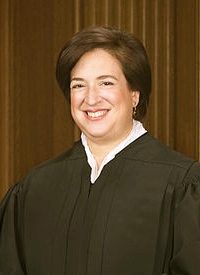
Just 12 days after 49 congressmen requested an official inquiry into the involvement of Supreme Court Justice Elena Kagan (left) with the Patient Protection and Affordable Care Act (PPACA, aka ObamaCare) during her tenure as U.S. Solicitor General, the House Judiciary Committee has complied. Judiciary Committee Chairman Lamar Smith (R-Texas) sent a July 6 letter to Attorney General Eric Holder asking for “relevant documents and witness interviews in order to properly understand” Kagan’s role with regard to the legislation itself and related litigation.
Perhaps the committee will have better luck in wresting those documents from the Justice Department’s clutches than private organizations have had. As the congressmen pointed out in their letter to the committee, “the Justice Department has been uncooperative to date with repeated [Freedom of Information Act] requests that seek the full body of relevant emails from the Office of the Solicitor General that would reveal the scope of Justice Kagan’s involvement in PPACA defense activities.” Both the Media Research Center and Judicial Watch were forced to sue the Justice Department in federal court in order to obtain the documents they sought, and even then only a small number have been made available to them.
Still, wrote Smith, even these few documents “raise questions about [Kagan’s] unequivocal denial” of any involvement in considering the legal and constitutional issues related to PPACA or potential litigation arising from it. In her Senate confirmation hearings, Kagan stated categorically that she had neither been asked for nor offered her opinion on such matters. Yet the documents show that Kagan had a definite interest in the defense of ObamaCare, personally assigning then-Deputy Solicitor General Neal Katyal to coordinate the defense well in advance of the law’s passage because, as Katyal put it in a January 2010 email, “Elena would definitely like [the Office of Solicitor General] to be involved in this set of issues. I will handle this myself, along with an Assistant from my office, [name redacted], and will bring in Elena as needed.”
Moreover, once President Barack Obama had announced Kagan’s nomination to the Supreme Court, Kagan, Katyal, and Office of Public Affairs Deputy Director Tracy Schmaler, in a series of emails, made sure their respective stories about Kagan’s involvement with ObamaCare were, in Kagan’s words, “coordinated.” This became of particular concern in June 2010, when the possibility of Kagan’s having to recuse herself from ObamaCare cases before the Supreme Court was raised, at which point Katyal wrote Kagan, “I went over the timing that you have been walled off from Day One.”
In an attempt to determine “the extent of [Kagan’s] involvement” in the Obama administration’s legal position on PPACA, the Judiciary Committee is requesting from the Justice Department documents indicating Kagan’s involvement in or knowledge of “potential or actual health care legislation or litigation,” referencing Kagan’s exclusion from “any matters involving health care legislation or litigation,” or mentioning “possible recusal by” Kagan from any such matters “if she were to be confirmed as a Supreme Court Justice.” In addition, the committee seeks to interview both Katyal and Schmaler.
“Given the speed with which PPACA litigation is proceeding,” wrote Smith, “I ask that these materials be provided and arrangements for the interviews be made by July 29, 2011.”
Should the Obama administration choose to cooperate with the committee, and should the documents it supplies and the interviews with Katyal and Schmaler show conclusively that Kagan lied to the committee during her confirmation, Congress will be practically forced to act. At the very least legislators should demand Kagan’s recusal from any ObamaCare cases that come before the court as required by law. If she refuses to comply — and perhaps even if she doesn’t, since her answers to the committee’s questions during her confirmation were (under this scenario) false — the House of Representatives would then be in a position to impeach her and the Senate, to try her and potentially to remove her from office.
The Kagan saga should make for yet another interesting battle of wills between the House and the Obama administration. The outcome may very well decide the fate of ObamaCare, challenges to which stand a better chance of succeeding without Kagan on the Supreme Court.



